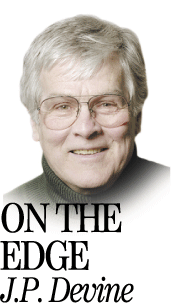This week, I read a nice story by writer Randy Billings about Maine’s U.S. Rep. Mike Michaud, about his 30 years as a millworker and his close ties to organized labor.
It was a nice story, a stirring tale, but it was that old worn lunch bucket the candidate keeps on his desk in Washington, once full of bologna sandwiches and apples he took to work in the mill at Great Northern Paper Co. in East Millinocket, that stuck out and opened a flood of memories. “Little things mean a lot,” my mother always said, as she dropped chicory into her coffee.
It doesn’t look like the old lunch bucket, or pail, from workers of my childhood, but close enough. As a child, I watched men walking by the house on their way to the streetcar stop, carrying lunch buckets. These were men who worked at the old Monsanto plant, the Anheuser-Busch and Falstaff breweries and International Shoe Co. on North Broadway.
St. Louis was, for years, famous for making beer and shoes, and quite a few of these men lived in my neighborhood.
Older family voices told me that the devastating effects of the Great Depression came slowly to St. Louis, because after 1933, when President Franklin Roosevelt tore up the prohibition law, beer was king and St. Louis, the Vatican of beer, went back to work.
After school, my brothers and cousins went to work in whatever jobs were available, carrying lunch buckets or bags full of bologna and cheese, leftover meatloaf and my brother Jim’s favorite, tomato and onion on Wonder Bread. Then one day the sky darkened and the parade of men with iron lunch cans started slowing and eventually faded away.
There was a newspaper picture at the time of a huge pile of lunch buckets, a political art piece that some unemployed workers had created downtown on the riverfront. It was a haunting reminder that there was no need for lunch buckets, because there was no food to put in them and no place to carry them to.
Dec. 7, 1941, of course, changed everything. Workers vanished into uniforms. Those left behind went to work at the aircraft factories and weapons factories. Lunch buckets were back in fashion, this time with Spam on Wonder Bread with mustard.
I got my first summer job in 1949 at the old Johnson Shoe Co. It was good money but hard work. I was put to work making black plastic feet for shoe displays. Each morning I made my own lunch, braunschweiger with catsup on Wonder Bread, a banana and cookie of the day.
Each noon I would eat on the loading dock with the old veterans, union guys with dented and painted lunch buckets that had seen better times. I listened to their stories of the Depression. I learned about Dizzy Dean, Pepper Martin and the rest of the Gashouse Gang; and about Salerno and Bastogne. I learned for the first time their personal struggles. I knew nothing about unions then. I knew nothing about the real world, about the importance of having a job, of the terror of losing one. I saw big men cry. It was the beginning of my real education.
After high school, before I left for the Air Force, I got my first union card on the E.J. and Elgin Railroad, working out of Waukegan, Ill., as a fireman. I was 17 and proud of it, but no lunch pail. I ate chili with onions with the brakemen up the street at a Polish saloon, where I got my first sip of beer from a glass held by the dirtiest hand I had ever seen — from a railroad man, a union man. It was delicious.
Hollywood, where I made a good living, is a union town. In my time I belonged to five different unions or guilds — one for film, one for television, another for theatre, commercials, nightclub work and finally, before I started working full time as an actor, with IATSE, the International Alliance of Theatrical Stage Employees, so that I could land a part-time job putting together the set of the popular “Dating Game” TV show. Hollywood is not all cashmere jackets and soft shoes. Hollywood is run by working men, union men who start at 4:30 a.m. while stars are still asleep.
So I guess Mike Michaud’s passion for unions and his beloved lunch bucket jarred this aging humorist awake today. I was spending my teenage years looking for heroes, and there I was working alongside them, sitting on a loading dock sharing food with them from lunch buckets, some of which bore the slogan UNION.
Ain’t it funny what you remember when you see some little thing like a lunch bucket?
J.P. Devine is a Waterville writer.
Send questions/comments to the editors.


